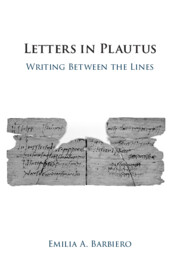1 - Bacchides
A Scene of Writing
Published online by Cambridge University Press: 01 December 2022
Summary
Chapter 1 elucidates Bacchides’ interface between communicative media, arguing that it exemplifies how modes of correspondence work in the Plautine universe, and investigates the kinetic force of communication by proxy within the plot. It also considers the textual ruse devised by Chrysalus, with special attention to the dictation-cum-scheming scene at Bacch. 714-60. This onstage portrayal of epistolary composition is an unicum both amongst the Plautine letter plays and across classical literature in that it provides a rare glimpse of letter writing in action. The scene of writing is also rich with metatheatrical and metapoetic imagery, illustrating a main premise of this book, viz. that writing in Plautus is a source of creativity and comic power inside the play that reflects the playwright’s poetic enterprise outside of it.
- Type
- Chapter
- Information
- Letters in PlautusWriting Between the Lines, pp. 17 - 56Publisher: Cambridge University PressPrint publication year: 2022

